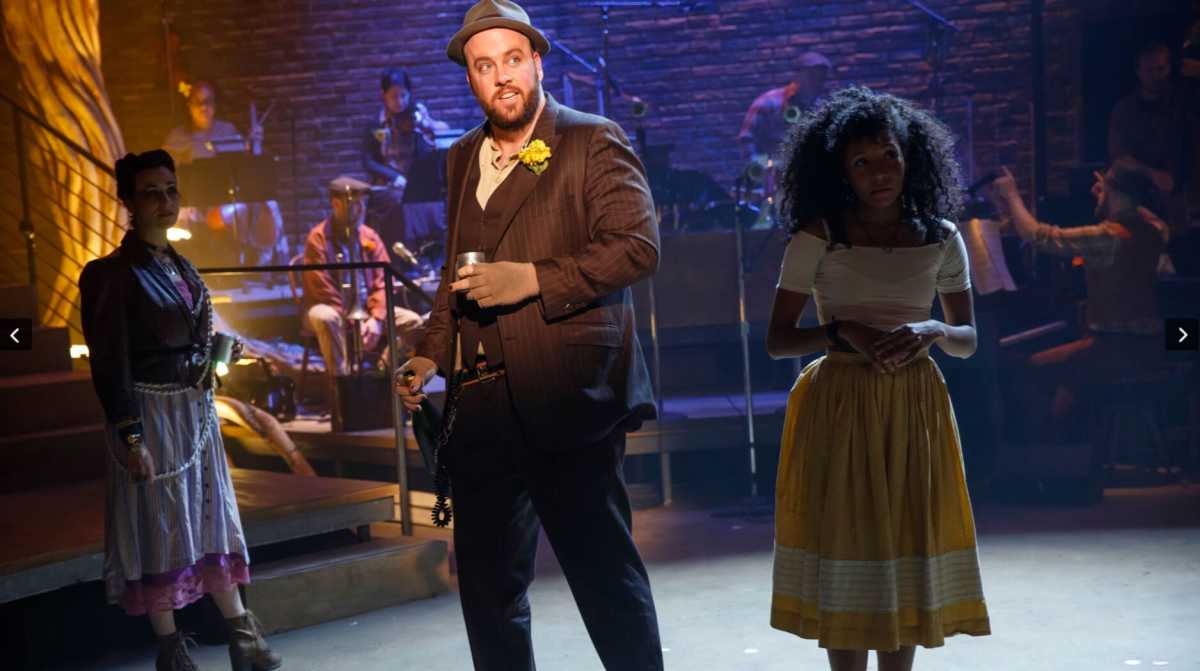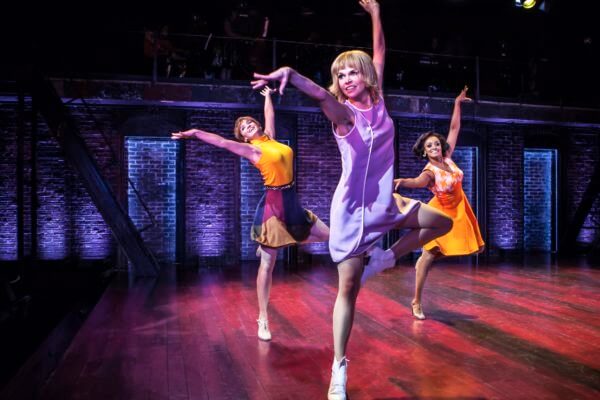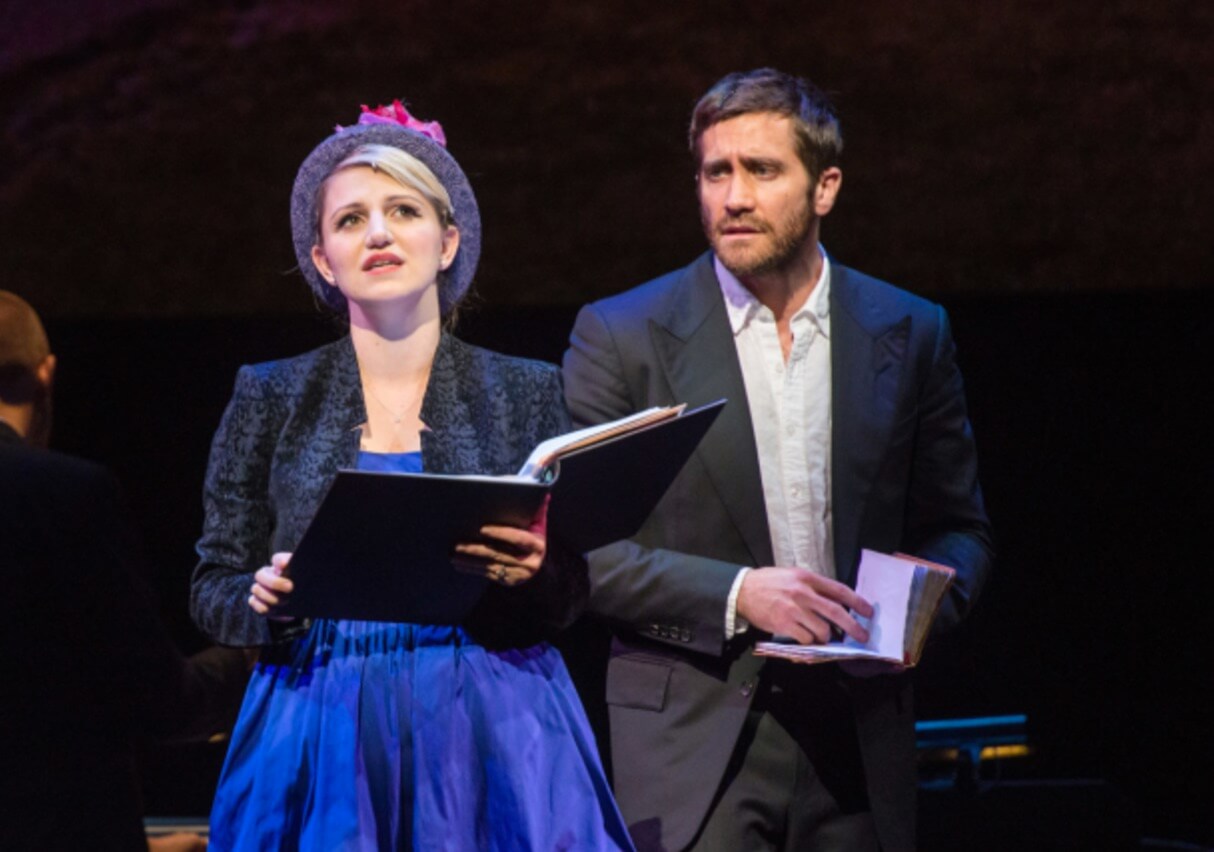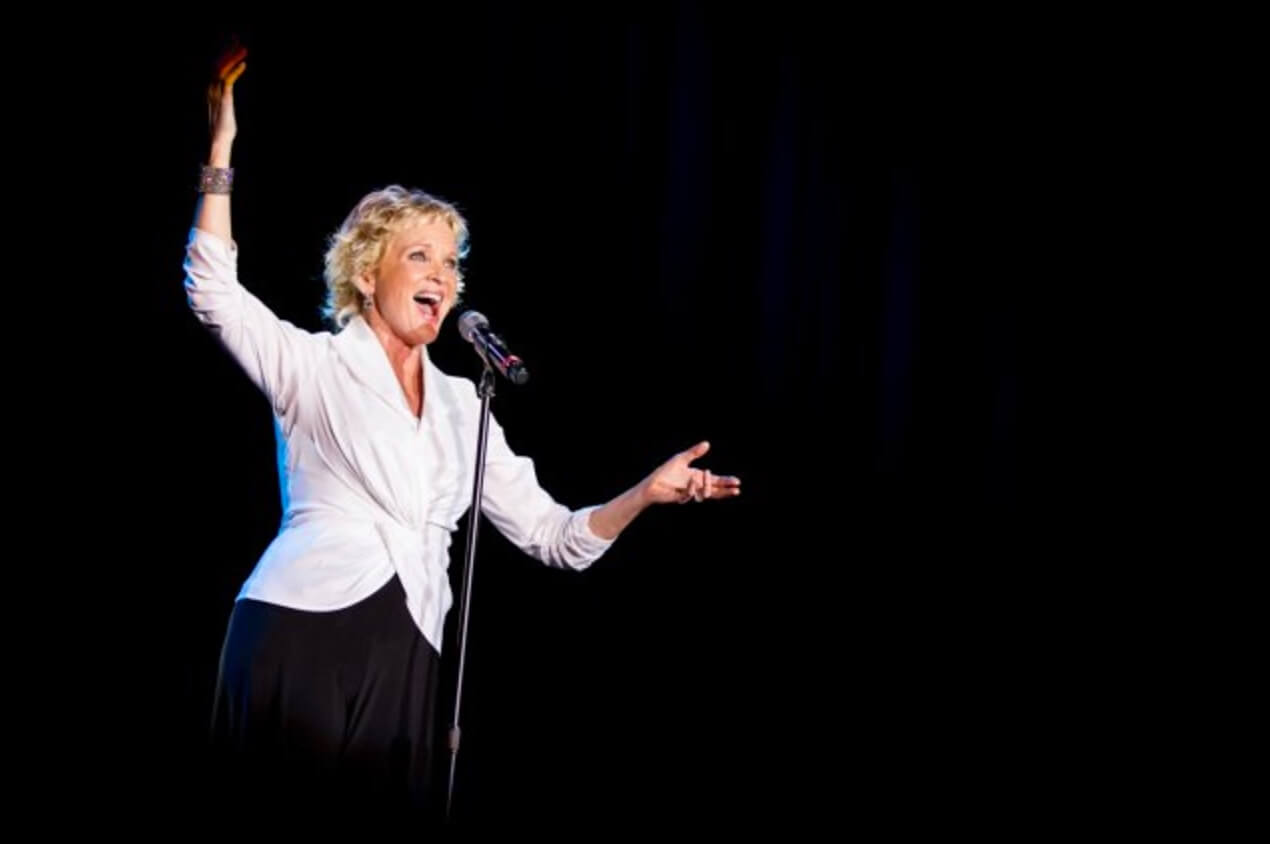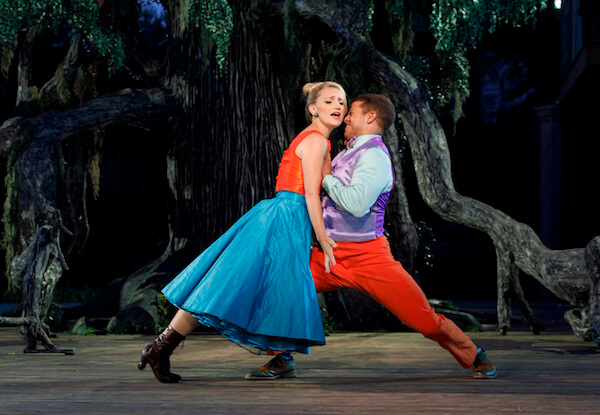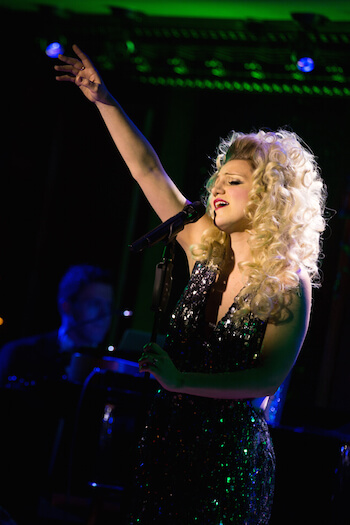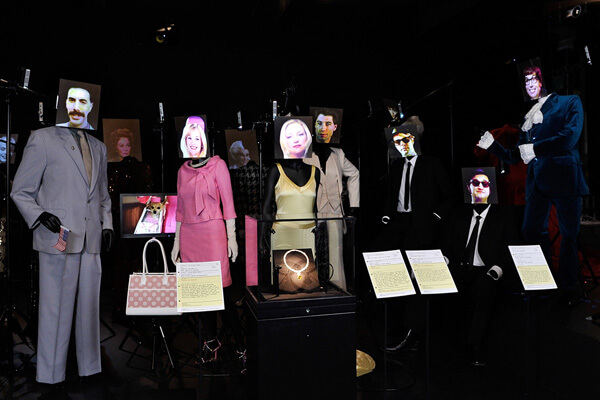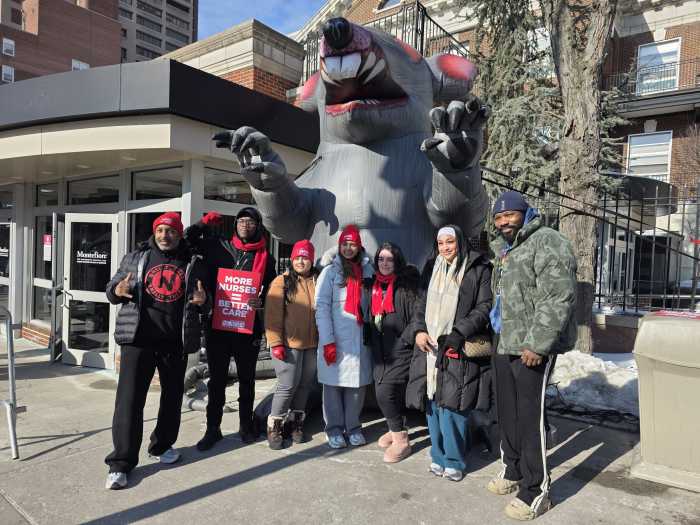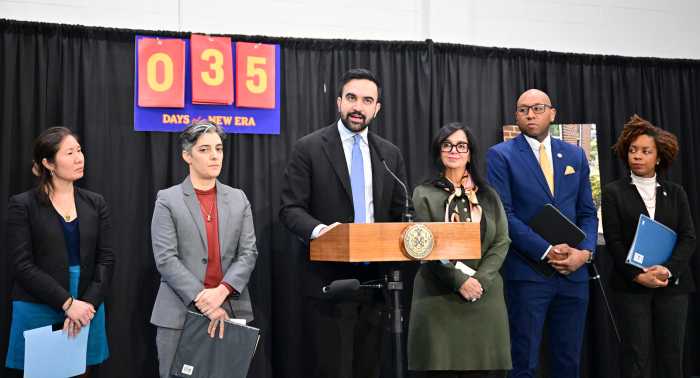Agnes Moorehead as the Baroness Aspasia Conti in “Mrs. Parkington.” | MGM
And so, 2016 ends with both a bang (of the most unsettling proportion with the incoming POTUS’ myriad threats) and a whimper (all of us, in reaction), yet the Agnes Moorehead Awards for the 10 Best Live Performances – the Aggies, if you will – still need to be bestowed upon the worthy.
I should start by noting that I recently sat through the entirety of La Moorehead’s 1944 film “Mrs. Parkington,” for which she received an Oscar nomination as Best Supporting Actress. Scandalously, Moorehead, like Garbo, like Stanwyck, like Cary Grant, never won an Academy Award. She certainly deserved one for her epochal performance in “The Magnificent Ambersons,” but “Mrs. Parkington” is another story. In it, she plays the Baroness Aspasia Conti, who is supposed to be French, and Aggie is so vairy, vairy Franch – in almost a heavy Teutonic, not soufflé-light Gallic way – it kind of hurts. She is supposed to be a world-class, raving beauty courtesan type, but all the massed effort of MGM, i.e. Irene on the clothes, Sydney Guilaroff on the hair, Jack Dawn on makeup and diva favorite Joseph Ruttenberg as cinematographer, weren’t quite able to create this effect. It’s like when I had to suspend belief in “A Little Night Music,” with Elaine Stritch playing a former scandalously successful courtesan, over whom men died, singing about her many “Liaisons” – never mind when I saw Margaret Hamilton do it. You just thought, “Oh, Granny is a compulsive liar, too!” (Aggie did wear the bustle marvelously in “Mrs. Parkington,” though.)
When great live performances trump hate
And now, the awards:
“The Band’s Visit”
When I heard that my favorite modern musical composer, David Yazbek, was working on a musical version of this winsome 2007 Israeli film, I got excited for, like Yazbek, I am enraptured by Middle Eastern music, and couldn’t wait to see what he’d come up with. He surpassed all expectations with this sublimely funny and true study of a culture clash between Egyptians and Jews in a miserable nowhere little burg.
The curtain call at the Atlantic Theater Company's production of David Yazbek and Itamar Moses' “The Band's Visit,” which runs through January 8. | DAVID NOH
The theme is really loneliness and the search for love and, as drolly book-written by Itamar Moses, brilliantly directed by David Cromer, spectacularly designed by Scott Pask, and acted by a cast you just love, each and every one of them, the adorable sad sacks, it is stirringly original, relatable, universal, and blah-blah-blah (as one of Yazbek’s ultra-terrific, at times hysterically jaded lyrics would have it).
There is real romance on the stage of the Atlantic Theater (through Jan. 8, 336 W. 20th St.; atlantictheater.org), as well as bitingly hilarious satire, and this is embodied in the New York theater’s new star of the year, Katrina Lenk. World-weary does not even begin to describe this gorgeous Israeli desert rose, adrift in a dusty Nowheresville. Whether extolling the non-joys of her dull, tiny town – very funny here – or, in a magical encounter with Tony Shalhoub’s loser Egyptian orchestra leader, recalling the beauty of vintage movie stars Umm Kulthum and Omar Sharif in Yazbek’s loveliest, most haunting song, she lifts the production into a stratosphere of refined intelligence and sensuality. Indeed, I would recommend every aspiring young actress go and just watch the way she moves, from the cynical shifts of her body during the humorous, self-deprecating numbers to her enchantingly wafting arms.
Sutton Foster in “Sweet Charity.” | MONIQUE CARBONI
“Sweet Charity” I was never a huge fan of this Bob Fosse/ Neil Simon Broadway reduction of Fellini’s “Nights of Cabiria,” which always struck me as misogynistic and condescending to the “lower orders” of taxi dancers and the like. How wonderful it is to report that Leigh Silverman’s reduction of the reduction works like a minimalist charm, creating a tiny, sleazy, claustrophobic world for its ever-innocent dumb-as-dirt heroine to go searching for love in all the wrong places. A stripped-down, all-girl band serves up the Cy Coleman-Dorothy Fields songs with amazing brio, Joshua Bergasse’s choreography really cooks in its way, divorced, as it is, from all that famed Fosse-glossy, and Clint Ramos’ costumes are genius, from the “hippie-wear” of the “Rhythm of Life” (I craved every single outfit) to the very weird but very right micro-mini dress Charity (Sutton Foster) wears much of the time – half hospital gown, half six-year-old’s painting smock, with many a revealing flash of panty, to emphasize her aching vulnerability and ever-present tendency to embarrass herself.
Matching the bold fearlessness of this costume choice is the performance of Foster, her best, most emotionally deep one yet (and that’s truly saying something). Was there really ever such a triple threat as she, all the while bringing that essential element which often eluded the great stars of yore – being completely human the entire time?
The show is also a terrific workout for her rarely seen comic chops and, in triumphantly underlining Charity’s basic doofusness, like in the slapstick closet seduction scene, she evoked the very best of comediennes like Carol Burnett, Madeline Kahn, and Ruth Buzzi. While the very intimate Signature Theater space lends itself beautifully to Silverman’s contracted vision (Foster was often a mere five feet away from me), it also has the disadvantage of a distinctly limited number of seats (hard-to-get tickets are now going for $500). This means, especially after Ben Brantley’s asinine “meh” review in the Times, which may have killed any possibility of a Broadway transfer, that much of the world will never see Foster make this role her own and, like Danny Burstein in “Fiddler on the Roof,” even surpass its originator.
What a shame, for, in this much darker and deeper “Charity,” the devastating ending of it is simply riveting, with its heroine, alone in the dark and spotlit, the sad gamine of gamines, staring at the possible nothingness before her and repeating the words, “You should see yourself.”
“The End of Summer”
S.N. Behrman was one of the most graceful and literate of American playwrights with a huge reputation in his day that has, sadly, not continued in our time. Why? He is simply too sophisticated, subtle, and – horror of horrors! – unironically romantic to fit today’s bang ‘em over your head obviousness and anti-intellectualism. His specialty was that trickiest of genres: the drawing room comedy with an important statement to make beneath the filigreed, witty dialogue and posh setting.
Metropolitan Playhouse did him proud with its revival of one of his best, a 1936 vehicle written for the incomparable light comedienne Ina Claire. The cast – especially Kelly Cooper, who had the charisma and suaveness of no less than Cary Grant (with something deeper about the gray matter) as a maybe-charlatan doctor bent on controlling his patients – was a top-to-bottom delight. Alexander Harrington’s direction was spot-on and rife with delicious details (like the unerringly curated 1936 songs playing as you entered the theater, which set the mood perfectly). Sidney Fortner’s costumes were at times opulently glamorous (and completely reflective of the work of this fine artisan), and Cao Xuemei’s set design was the best in this this theater yet, a total, painstakingly executed replica of a charming summer house on the more privileged of the rocky shores of Maine.
Ben Whishaw in “The Crucible.” | JAN VERSWEYVELD
“The Crucible”
I confess I trudged toward this show with a heavy heart, not really in the mood for Arthur Miller’s shrieking, religiously duplicitous brats (many of whom also appeared way back when, in the 1937 Claudette Colbert movie “Maid of Salem”), or the direction of white-hot Ivo van Hoeve, who absolutely ruined “The Little Foxes” and “View from the Bridge” for me.
What a pleasant surprise, then, to rediscover this warhorse, brilliantly rethought and updated, transformed into thrillingly bravura theater, with its final, harrowing scene between the tortured central Puritan couple – Ben Whishaw (miraculously surprising here) and Sophie Okonedo (perhaps the greatest actress around today), achieving not only real, heartbreaking tragic depth, but the ever-elusive quality of redeeming, authentic spirituality to absolutely illuminate Miller’s words.
Two directorial touches haunt me to this day: that wolf (actually a rare Tamaskan dog, obtained with great effort by genius animal-wrangler Bill Berloni) who wandered out into the eerily haunted classroom set and looked at the audience as the first act curtain fell, and that silvery, cobweb-like filament of saliva that ever so slowly dripped from Tavi Gevinson’s lower lip during her most distraught moment while confessing her witchy sightings.
“Sunday in the Park with George” at Encores! This benefit performance of Sondheim’s artiest show, among other things, made me finally get Jake Gyllenhaal, whom I’d always regarded as a pretty boy, blessed with more looks than talent – and, yes, I was not a fan of “Brokeback Mountain,” that gay film made by a lot of straight people. He came through for the first time for me with the Encores!’s “Little Shop of Horrors” – I thought, showing previously unexpected farcical chops – but as George Seurat he really blew me away with a totally unexpected, quite fine singing voice (“Carousel”’s Billy Bigelow, “Oklahoma”’s Curley – he’s ready for any of them) and a performance of startling sensitivity and force, every bit the equal – and a lot more vulnerably human – than Mandy Patinkin, who originated the role.
Annaleigh Ashford and Jake Gyllenhaal in the Encores! production of “Sunday in the Park with George.” | STEPHANIE BERGER
Annaleigh Ashford played Dot, Seurat’s muse, and, while she couldn’t quite erase the memory of Bernadette Peters at her most entrancing (who could?), she was, nevertheless, quite delectable, bringing her own solid voice and original comic timing to the part – underwritten as it is, as is so much of this show. (I can’t help wondering if Sondheim’s “Company” and “Follies” might not also have benefited from a draft or two more of their books, if only to deepen and enrich the scaffolding.) And, if ever there was a luxury cast, this one was it, with the starry likes of Phylicia Rashad, Zachary Levi, Lauren Worsham, Ruthie Ann Miles, Brooks Ashmanskas, and Claybourne Elder filling in, in small parts.
Christine Ebersole at the Cafe Carlyle I don’t think there’s a singer on this planet I’d rather hear. Her range – Broadway musical, operetta, country, pop, soul – is unlimited, and it all came together marvelously at her engagement, “After the Ball,” devoted to the experience of being an empty-nester parent. In the course of this exquisitely conceived gig, she sang some of the greatest songs ever composed in this country, and she was literally great on every single one of them.
Christine Ebersole. | CHRISTINEEBERSOLE.COM
Result: pure musical heaven, this magical meeting of the very best vocalist with the very best material to be found. The fact that she’s a great, ageless beauty doesn’t hurt, either, as there were visual, as well as aural, moments of splendor, like the way she sinuously, sensuously reclined her body during a spellbinding medley of Jerome Kern’s “Yesterdays” and Jerome Moross and John La Touche’s “Lazy Afternoon.” Ebersole and her collaborators have an uncanny knack for perfect medleys, and the one which she dedicated to her three adopted children, consisting of “Wait Til You See Her” with an utterly shattering “Little Green,” Joni Mitchell’s aria about the child she gave up for adoption (and later found), was the evening’s emotional highlight.
There has been so much false scuttlebutt in recent years about Ebersole’s supposed wacky political beliefs and her fanatically pressing them on her co-workers in the theater, that it’s a positive pleasure for me to denounce them as lies, spread by bitches all too eager for a misogynistic catfight scenario between her and Patti LuPone in their upcoming show, “War Paint.” I caught the two divas at their Times Talk on December 13, and it was a radiantly sincere love fest between the two, so let the Broadway haters chat away in their delusional snake pit.
Norbert Leo Butz at 54 Below
On the male side of things cabaret, this show was based on Greek goddesses who resembled the women in this wondrously chameleonic star’s life, and, like Ebersole’s engagement, it was educational, besides being a powerful lot of smokin’ music. Butts’ sheer joy in performing is always tonic – he’s a show-off, all right, but like Cagney, the exuberance is fully earned with the protean talent so evident at all times. Backed by the best band to be found anywhere, this was a gleeful, raunchy, down to earth, and in-your-face helluva good time, enlivened by raucous covers of pop songs done so originally and so well that, with the right marketing, one could almost see Butts deserting Broadway, getting into recording, and playing stadiums around the world. His rendition of “Ruby, Don’t Take Your Love to Town” mined genuine and devastating dramatic gold from that maudlin chestnut, all of it marked by that stirringly propulsive beat, underlining all the moaning mournfulness. And I never thought I would want to hear “Come on Eileen” ever again, but as pogo-performed by the electrifyingly energetic Butts, I can now see myself screaming for it the next time I catch him.
Ani DiFranco at New York Society for Ethical Culture
I caught this tireless activist/ singer/ songwriter a few very sad days after Election Night, at this highly appropriate, graciously intimate space, and don’t think I could have had a better therapist. Factor in the wonderful Lizz Winstead to comment humorously and, more importantly, angrily about all this shit going down now, and you had an evening that was not only funny, stirringly musical, of course, but also deeply healing. I think it was my personal best double bill since a long ago Radio City concert that brought together – wait for it – Patti Labelle and Richard Pryor.
DiFranco’s concerts always bring out a divinely heimische crowd of gays, quite fabulous lesbians, die-hard hippies, and West Side bookworms, and it was one of those rare New York nights when everyone really did feel like family. I had just been given the attempted runaround trying to get to the venue by the phalanx of cops in front of nearby Trump International hotel. “Where ya goin’?,” they asked as I passed the security barricade on Central Park West. “Guest of the hotel,” I blithely replied, proceeding to walk on and completely bypass the entrance to that Trump Dump. You really thought I was going to go out of my way around the block to get to Ethical because of our new “President” Oompa Loompa?
Duran Duran at the Apollo The 1980s pop power band returned to Gotham, and put on a brilliant show that also proved that cute can, indeed, age very well. With a full-scale and quite lavish staging in terms of lighting projections and marvelous sound, they performed all the songs that provided the soundtrack to so many of our careless, partying salad days. Nice to observe that they all looked in fine fettle and – thank God – still hip, with no embarrassing clinging to the trends of their youth (see Genesis, frightening). John Taylor still has those razor cheekbones, girls, and Simon Le Bon’s amazingly healthy voice is, if anything, even stronger and better today. He was a marvelously suave and witty host to the evening, as well, properly awed by the greats who have preceded the lily white likes of him & Co. on that hallowed stage, and I suddenly wondered why he was never cast as a singing James Bond.
Chris Sullivan in the New York Theatre Workshop production of “Hadestown.” | JOAN MARCUS
“Hadestown”
Composer Anaïs Mitchell and director Rachel Chavkin collaborated on this ultra-vivid and soulful retelling of the Orpheus myth at the New York Theatre Workshop. Thrillingly musical, visually splendiferous, and performed by a beautiful cast, with standouts being the rapturously funky Amber Gray and uber-bear Chris Sullivan, the sexiest guy seen onstage this year.
And that’s a wrap. To all my faithful readers, Happy New Year! 2017 seems to be the first truly bleak one we’ve had in I can’t remember how long. But, recently, I was watching Terry Zwigoff’s wonderful “Crumb,” the 1994 documentary about artist Robert Crumb and his spectacularly dysfunctional family. Much of footage shot was during Nixon’s time in the White House, and I realize that we had an evil, megalomaniac president (although not stupid) back then, and people like the Crumbs – alienated, isolated, severely depressed, and medicated, with odd, obsessive hobbies – may have seemed like wack jobs then, but are today’s new normal. They and the similarly-minded artists and bohemians they hung out with – like me and my friends – really were the counterculture, against a backdrop of cheery conservative American go-getters of a very different dream. We survived all that then, and we shall survive this. And remember, a lot of excellent art – far more than now – was made during that time, much of it in response to the hell going around us.
Contact David Noh at Inthenoh@aol.com and follow him on Twitter @In_The_Noh.

